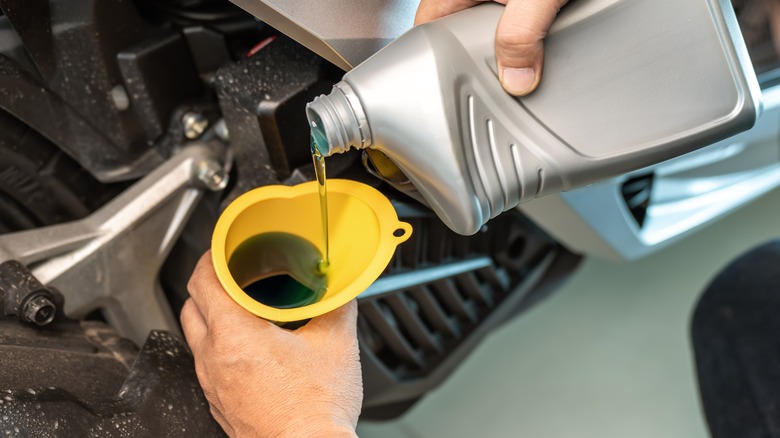Can You Use Car Engine Oil In Your Motorcycle?
Oil is an essential part of any combustion engine — including motorcycles — and it needs to be changed out regularly to keep everything running smoothly. But there are so many types of oil to choose from that it can sometimes feel overwhelming.
And that's just motorcycle oils. There's also a vast assortment of motor oils from various companies and of various formulas. Surely, it would be easier to just use the same kind of motor oil you already have sitting around for your car or truck, rather than worry about hunting for a specific motorcycle oil. At a glance, motor oil and motorcycle oil are both types of oil, so why wouldn't they be interchangeable? Ultimately, it's all about keeping the various parts of an engine running smoothly, right?
The thing is, there's more to it than that. A lot more. And while there is some wiggle room when it comes to adherence to certain motorcycle oils, it depends a whole lot on the model, manufacturer, and what potential stand-in oils you're looking at. So before getting into the particulars, just remember: When in doubt, always consult the manual.
The differences
Motorcycle engines are smaller than car or truck engines by a fairly decent amount, which means they have less overall physical mass in need of lubrication. That means they require a smaller volume of oil, and that oil needs to be able to flow through much smaller areas. Additionally, as Castrol points out, motorcycle motors often build up more heat and run faster than car engines. So you're left with an intricate series of mechanisms that need less overall oil to work harder — and using oil that isn't specifically designed to handle that is likely to cause problems.
Beyond these basic differences, there's also the matter of what motorcycle oil actually covers and protects — as opposed to regular motor oil in a car or truck. Regular motor oil is just for the engine, with other systems like the transmission getting their own specialized fluids to keep them running smoothly. Motorcycle oil, by contrast, flows through the engine as well as the clutch system and the gearbox.
Oil types can also make a difference, regardless of whether they're specified for cars or motorcycles, partially due to modern car engines being designed for lighter oils. Some bike manufacturers will tell you to stick with only MA graded motorcycle oils, while others allow a bit more leeway with API (American Petroleum Institute) graded oils.
What happens if you use motor oil anyway?
Despite it definitely being a bad idea to use motor oil in a motorcycle, it's not necessarily a catastrophic move depending on the situation. It's still highly recommended that, unless there's some kind of emergency or no other option, you always use whatever kind of oil the manufacturer recommends, though.
Twisted Throttle notes that using regular motor oil can work as a solution when you aren't able to get a hold of the specific motorcycle oil you need. However, it's also very important to get the weight (a.k.a. Viscosity) right. So, even if you can't get your hands on motorcycle oil, you absolutely want to make sure any motor oil you use as a temporary fix has the same weight number as the manufacturer recommended motorcycle oil. Ultimately, it's best to check the user manual for oil recommendations — which can differ from bike to bike — and stick as closely to that as possible. Be sure to avoid oils that say they're "Energy Conserving" or "Resource Conserving" as well, because their formulation (intended to improve the fuel economy in cars and trucks) can conflict with a bike's inner workings.
Should you grab the wrong weight or use a non-recommended oil type, you're probably going to have issues. Depending on the oil used and the model of bike, the use of automotive motor oil could result in acceleration loss, clutch slipping, gear failures, and a number of other possible engine issues.


